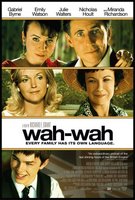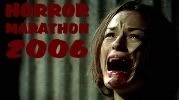 Wah-Wah
Wah-Wah is director/writer Richard E. Grant’s autobiographical tale of a disaffected youth growing up in colonial Swaziland under British rule, but for the rudimentary approach given to the material it may as well have taken place in a glass bubble cut off from the rest of the world. In the first scene, a young Ralph Compton witnesses a small piece of the affair that will soon break up his family: thought to be asleep in the backseat of a car, his mother and uncle indulge each other in ways sure to be damaging to his young eyes and ears. Progressively worse, however, is his fathers drinking, which escalates even after he takes on a second wife, an American woman named Ruby who quickly takes Ralph under her wing. Grant, certainly from personal experience, takes on the troubled feelings of an unstable adolescence such as Ralph’s with some touchingly illuminating details (a recurring facial tick that Ralph sports, a teenage obsession with
A Clockwork Orange, etc.), but he’s less skilled when it comes to thrusting the narrative forward as more emotional landmarks befall its characters. Perhaps like a misguided youth, the film doesn’t know quite what it’s trying to say, but this is less reflective of such ails than it is an impediment upon all the things that
Wah-Wah does well otherwise. Ultimately, the many good performances are siphoned into a series of developments that, if not culled from numerous other films of the genre, are left emotionally tepid from a lack of zealous personal distinction, instead reliant upon conventions that nip
Wah-Wah’s uniquely specific potentials squarely in the bud.




 Wah-Wah is director/writer Richard E. Grant’s autobiographical tale of a disaffected youth growing up in colonial Swaziland under British rule, but for the rudimentary approach given to the material it may as well have taken place in a glass bubble cut off from the rest of the world. In the first scene, a young Ralph Compton witnesses a small piece of the affair that will soon break up his family: thought to be asleep in the backseat of a car, his mother and uncle indulge each other in ways sure to be damaging to his young eyes and ears. Progressively worse, however, is his fathers drinking, which escalates even after he takes on a second wife, an American woman named Ruby who quickly takes Ralph under her wing. Grant, certainly from personal experience, takes on the troubled feelings of an unstable adolescence such as Ralph’s with some touchingly illuminating details (a recurring facial tick that Ralph sports, a teenage obsession with A Clockwork Orange, etc.), but he’s less skilled when it comes to thrusting the narrative forward as more emotional landmarks befall its characters. Perhaps like a misguided youth, the film doesn’t know quite what it’s trying to say, but this is less reflective of such ails than it is an impediment upon all the things that Wah-Wah does well otherwise. Ultimately, the many good performances are siphoned into a series of developments that, if not culled from numerous other films of the genre, are left emotionally tepid from a lack of zealous personal distinction, instead reliant upon conventions that nip Wah-Wah’s uniquely specific potentials squarely in the bud.
Wah-Wah is director/writer Richard E. Grant’s autobiographical tale of a disaffected youth growing up in colonial Swaziland under British rule, but for the rudimentary approach given to the material it may as well have taken place in a glass bubble cut off from the rest of the world. In the first scene, a young Ralph Compton witnesses a small piece of the affair that will soon break up his family: thought to be asleep in the backseat of a car, his mother and uncle indulge each other in ways sure to be damaging to his young eyes and ears. Progressively worse, however, is his fathers drinking, which escalates even after he takes on a second wife, an American woman named Ruby who quickly takes Ralph under her wing. Grant, certainly from personal experience, takes on the troubled feelings of an unstable adolescence such as Ralph’s with some touchingly illuminating details (a recurring facial tick that Ralph sports, a teenage obsession with A Clockwork Orange, etc.), but he’s less skilled when it comes to thrusting the narrative forward as more emotional landmarks befall its characters. Perhaps like a misguided youth, the film doesn’t know quite what it’s trying to say, but this is less reflective of such ails than it is an impediment upon all the things that Wah-Wah does well otherwise. Ultimately, the many good performances are siphoned into a series of developments that, if not culled from numerous other films of the genre, are left emotionally tepid from a lack of zealous personal distinction, instead reliant upon conventions that nip Wah-Wah’s uniquely specific potentials squarely in the bud.




